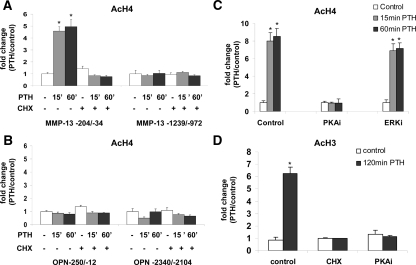Figure 3.
PTH-induced increases in histone H4 and H3 acetylation require de novo protein synthesis and the PKA pathway. UMR cells were preincubated with protein kinase inhibitors or cycloheximide for 30 min before examination of PTH-induced increases in histones H4 (A, B, and C) or H3 (D) acetylation. Quantitative real-time PCR was done using primers from the MMP-13 promoter (A, as shown; C and D, −204/−34) to amplify the ChIP DNA samples or the input DNA samples obtained from cross-linked but not immunoprecipitated chromatin or using primers for the osteopontin promoter (B) to amplify the ChIP DNA samples. UMR cells were preincubated with cycloheximide (30 μg/ml), PKA inhibitor (H-89 dihydrochloride, 50 μm) or ERK inhibitor (PD 98059, 50 μm) for 30 min before treatment with rat PTH (peptide 1–34, 10−8 m). Error bars represent the sd of three independent experiments. *, P < 0.001 compared with vehicle-treated control. Ac, Acetylated; CHX, cycloheximide; OPN, osteopontin.

